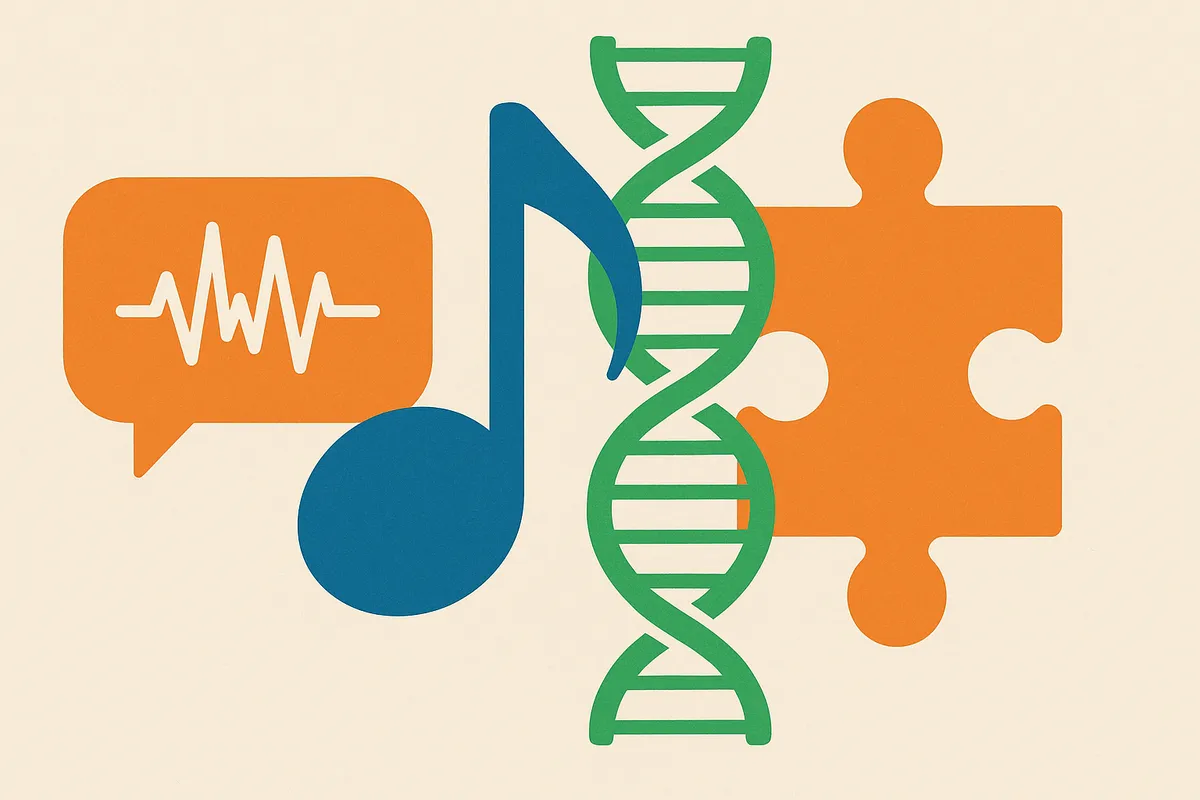Echoing Brains: Genetics, Stuttering, Autism and the Music We Miss
 What stuttering, autism and musicality reveal about our wiring — and our worth
What stuttering, autism and musicality reveal about our wiring — and our worth
A new study in Nature Genetics has quietly done something rare. It mapped genetic correlations among stuttering, autism and musicality — and found shared threads not of disorder, but of neurodevelopmental rhythm.
That might not sound revolutionary. But in a field still saturated with “risk factors,” “deficits” and euphemized eugenics, it is.
The paper — "Large-scale genome-wide analyses of stuttering" by Polikowsky et al — doesn’t frame autism as a crisis. It doesn’t treat stuttering as failure. It doesn’t pitch musicality as compensation. It simply says: these traits co-occur in the genome — and maybe that means we need to listen differently.
Because sometimes, the same genes that complicate speech also compose beauty.
What the Study Found
Researchers from the University of Göttingen and international collaborators conducted a genome-wide association study (GWAS) involving tens of thousands of individuals. They analyzed genetic data related to stuttering, autism and musical aptitude — not as isolated conditions, but as overlapping traits shaped by shared neurobiology.
They found:
- Stuttering and autism share genetic patterns tied to language processing, auditory-motor timing and neural coordination.
- Stuttering and musicality overlap in rhythmic perception and beat synchronization.
- Autism and musicality also show shared correlations, particularly in sensory timing, pattern recognition and motor control.
The paper avoids pathologizing. It doesn’t treat these overlaps as liabilities. It offers dimensional framing — and resists the impulse to diagnose difference as damage.
That matters.
This Isn’t a Cure Paper. It’s a Complexity Paper.
There is no speculation about prevention. No talk of early detection. No hint that the goal is to reduce autistic traits.
Instead, the authors suggest that developmental traits often co-occur because they are shaped by the same timing systems. Brains that speak haltingly might also feel rhythm vividly. Brains that struggle with speech fluency may track musical phrasing with ease.
The same biology that complicates speech might also enhance rhythm and creativity. That doesn’t make challenge disappear. But it forces us to ask: are we studying this difference to understand it — or to erase it?
What Gets Called Dysfunction May Just Be Divergence
If you’ve been told your autistic traits are problems to fix — your echolalia, your verbal pacing, your rhythm-bound way of thinking — this study offers a counterstory.
It suggests that the same neural architecture that struggles with fluent speech might also be wired for musical nuance. That timing differences can be difficult — but also distinctive. That divergence isn’t always disorder.
We don’t need to justify our existence with talent. But we also don’t need to accept the story that our only reality is dysfunction.
What Research Should Learn From This
This is the kind of genetic study that deserves attention — not because it’s sensational, but because it’s careful. It draws links without moral judgment. It avoids treating difference as pathology. It opens doors without pretending to know where they lead.
There are no autistic co-authors. That absence should be named. But the study’s language avoids harm, and its structure leaves space for future participatory work.
The next step is to include the people these genes belong to. Not just as samples, but as shapers of the questions. Because interpretation is never neutral — and this kind of science needs framing as much as it needs data.
Final Thought
Autism, stuttering and musicality are often seen as separate domains. But in our bodies — and in this research — they overlap. They loop. They echo.
What if the same brain that stutters also sings? What if the wiring we try to correct is the same wiring that produces connection, cadence and emotional resonance?
What if the problem isn’t the trait — but the story we tell about it?
This isn’t just about genes. It’s about dignity. And about what becomes possible when we stop dividing what’s difficult from what’s beautiful.
Not broken. Not less. Just differently timed.